News
The latest updates on what’s happening at Experian. In this section, you’ll find company news including product announcements, industry awards, strategic partnerships, and other milestones. Whether we’re launching something new, teaming up with a key partner, or being recognized for our work, this is where we’ll share the moments that matter.

Cookies are leaving us, but that doesn’t have to mean performance has to. That’s why Experian is taking the steps needed to future-proof identity in our Graph, including adding Unified ID 2.0 (UID2) from The Trade Desk. Experian currently supports UID2 in our Graph outputs for demand-side platforms (DSPs). UID2 support in our Graph outputs will be available to all approved partners by December 2023. In this blog post, we talk about why cookieless IDs, like UID2, that are coming to market because of cookie deprecation, are important, and how incorporating cookieless IDs into an identity graph can help you prepare for a cookieless future. What are cookieless IDs? Like cookies, cookieless IDs provide you with a comprehensive view of a consumer’s digital activity. Unlike cookies, identity providers produce cookieless IDs, using user-consented data and deterministic and probabilistic data signals (like hashed emails or mobile ad IDs). Cookieless IDs are a newer identifier that allows the advertising industry to maintain our understanding of consumers’ digital actions, helping to ensure we continue to generate smart, data-driven insights, targets, activation strategies, personalized experiences, and measurement and attribution. Why should you incorporate cookieless IDs into an identity graph? Adding cookieless IDs to an identity graph allows for licensees of the graph to: Resolve the universal ID to a consolidated consumer profile and know which other digital IDs tie to the cookieless ID Establish a unified view of the consumer with a privacy-compliant ID Produce data-driven and informed advertising strategies that still drive results, without the use of cookies Experian’s Graph Experian’s Graph is one of the most robust and signal agnostic identity graphs in the market. Experian’s Graph supports most digital IDs, including cookieless IDs, such as ID5, UID2, and Hadron ID. When you license Experian’s Graph, you increase your ability to better understand the different digital IDs that tie to a household or individual. Additionally, with our cookieless ID support, you can continue to understand your consumer and their digital IDs in the cookieless world. Why is it crucial to include UID2 support in Experian's Graph outputs? The Trade Desk is the largest, independent demand-side platform. They’ve created a cookieless ID, UID2, that they hope can power the advertising world to come across the open web. UID2 is an alternative solution to third-party cookies that when utilized in an identity graph, can offer a clearer picture of your consumer, enabling frequency controls and better management, across both digital and connected TV (CTV). Approved DSPs can add UID2s to their Experian Graph, giving them access to one of the more trusted and prominent cookieless IDs in the market today. Additionally, DSPs can use this identifier to decide whether to bid on certain inventory or not, on behalf of their advertiser partner. And, if we hedge our bets, it will only grow in prominence and use. While only available to approved DSPs today for use in the Experian Graph, the forthcoming encrypted UID2 token will provide this capability to the entire ecosystem, which allows us all to speak the same language and operate as efficiently as possible. "We are excited to support UID2, one of the premier IDs to support the future of addressability across the open internet, in the Experian Graph. We continue to see the adoption of UID2 across the demand-side ecosystem, increasing addressability across growing channels like CTV and beyond. I am personally excited to see how this momentum continues to increase over the remainder of 2023 and into 2024."chris feo, svp, sales & partnerships, experian Future-proof your identity strategy with Experian Graph and UID2 We’ve seen the impact that cookies have had on digital advertising and marketing. With the impending third-party cookie deprecation, you will need to adopt alternative cookieless ID solutions such as Unified ID 2.0. Experian is well-positioned to help you navigate this change, offering UID2 support in our Graph outputs for all approved partners by December 2023. Take the right steps now to future-proof your identity strategy and discover lasting success even without cookies. Alongside Experian’s Graph solution, you can achieve resilience in an ever-changing world of digital marketing and advertising. Now is the time to get ready for a cookieless future. Connect with an Experian team member to learn more about our Graph capabilities today. Learn more about Experian's Graph today Latest posts
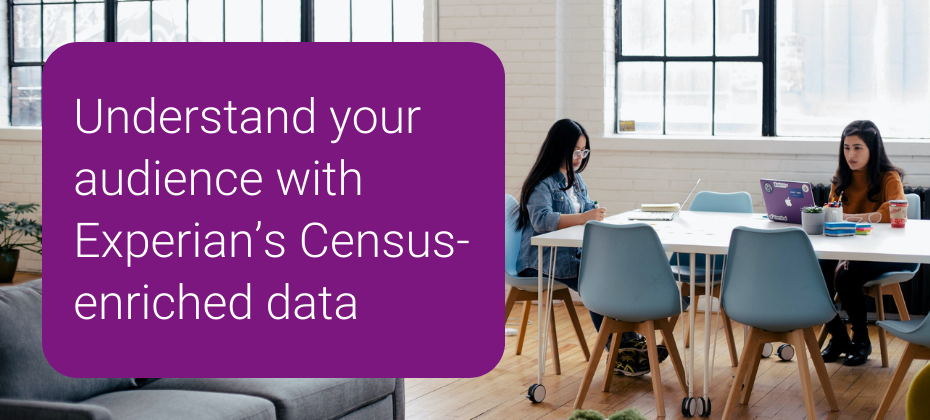
We are excited to announce that we’ve updated our CAPE data with 2020 Census data. This release updates estimates and projections from 2010 and replaces all previous CAPE data attributes. U.S. Census data offers a great opportunity for data enrichment The U.S. Census is conducted every 10 years to determine the number of people living in the U.S. in addition to collecting data on dozens of topics across 130+ surveys and programs. U.S. Census data is already broken out into regional groups and covers 100k+ different geographies: States, counties, places, tribal areas, zip codes, and congressional districts. Block groups are the smallest geographic area for which the Bureau of the Census collects and tabulates data. They are formed by streets, roads, railroads, streams, other bodies of water, and other visible physical and cultural features. What is CAPE? Census Area Projections & Estimates data (CAPE) data from Experian utilizes a proprietary methodology to make the data easy to action on for marketing use cases. Made from U.S Census and Experian consumer data, CAPE data sets are developed at the block group and zip code level and targetable at the household level. CAPE 2020 updates CAPE 2020 uses the 2020 Census data blended with other Experian data to update CAPE’s unique attributes for data enrichment and licensing. Multiple sources are used and data is delivered at a block group level or zip code. Experian provides unique CAPE attributes not available through other sources that provide Census data. These include our Ratio and Percentages attributes, Score Factors/Segments, and Mosaic. CAPE 2020 use cases Our CAPE 2020 data sets enable strategic marketing analysis and decision-making. You can use CAPE 2020 data to understand the differences in the markets you serve as they relate to core demographics, housing attributes, education, income, employment, spending, and more. You can do this to: Find populations that are not typically captured in standard demographics. Cross-reference Census demographics data with other behavioral and shopper data. Understand supply and demand for products sold. Get started with our CAPE 2020 data today If you are using Experian’s CAPE 2010 data, please work with your Experian representative to migrate to CAPE 2020. If you are interested in learning more about our CAPE data, get in touch with us today. Latest posts
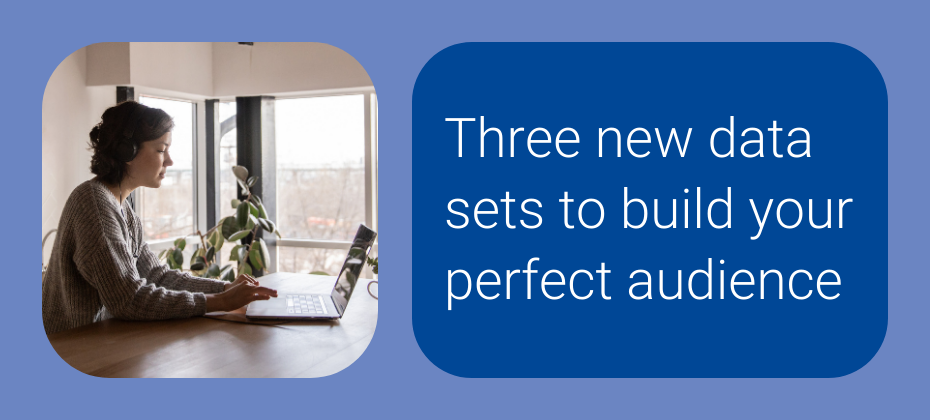
Over the last few months, Experian has released new syndicated audiences to most major platforms supporting retail and travel. In this blog post, we’ll highlight some of these new audiences and how they can be used with other data from Experian to build the perfect audience to reach your customers and prospects. What separates Experian's syndicated audiences Experian’s 2,400+ syndicated audiences are available directly on over 30 leading television, social, programmatic advertising platforms, and directly within Audigent for activation within private marketplaces (PMPs). Reach consumers based on who they are, where they live, and their household makeup. Experian ranked #1 in accuracy by Truthset for key demographic attributes. Access to unique audiences through Experian’s Partner Audiences available on Experian’s data marketplace, within Audigent for activation in PMPs and directly on platforms like DirectTV, Dish, Magnite, OpenAP, and The Trade Desk. Household Expenditure audiences We’ve created new predictive audiences to help retailers reach consumers across 35 categories likely to spend within that category. A few categories include Apparel, DIY, Health, and more. With the launch of these new audiences, we will retire our existing Household Consumer Expenditure, Online and Retail category audiences in the November Digital Master update. Who these audiences are for Our Household Expenditure audiences use data from multiple sources, providing brands with highly accurate purchase predictions and data that scales for digital execution. Household Expenditure audiences are an excellent solution for brands with new product lines or where targeting based on historical purchases lack signal brands seek. Building data from multiple data sources helps ensure high performance and accuracy and can illuminate trends in consumer shopping patterns. These trends can be used to help predict future shopping behaviors. How to refine our Household Expenditure audiences To refine your audience, you can combine this data with Experian’s demographic and household expenditure audiences to ensure you are reaching consumers. For example, suppose you’re an apparel brand launching a new line aimed toward women over the age of 40. In that case, you can use Experian’s demographic data to reach those women and layer in our household expenditure purchase predictor segment for women's apparel to reach their new target audience. Mobile Location audiences We’ve expanded our location database to include more locations and points of interest. With this new data, we could strengthen our existing mobile location audiences to broaden the reach, improve accuracy, and increase performance. We’ve created 11 new mobile location audiences with our new dataset that supports the retail and travel verticals. These new audiences include new shopping behaviors, including high-income and high-end shoppers and travel and entertainment behaviors, including visiting sporting arenas like MLB, NBA, NFL, and university stadiums. Who these audiences are for These audiences are for brands that want to reach consumers based on their location behaviors. Often valid for retail, travel, and entertainment brands, Mobile Location audiences provide brands with highly accurate data that shows previous intent and interest in critical locations. How to refine our Mobile Location audiences To refine your audience, you can combine your Mobile Location audience with Lifestyle and Interest data. For example, if you are creating an advertising campaign for a hotel near a university stadium for the largest game in the season, you could combine university stadium visitors with sports enthusiasts and in-market for travel to find consumers most likely to be interested in your campaign and staying at the hotel. Purchase-Based Transaction audiences For use cases where predictive audiences aren’t the best fit to reach the right consumer, such as targeting consumer’s historical purchases, we’ve created new purchase-based transaction audiences that utilize opt-in consumer transaction data across 29 retail categories, including apparel, home, lifestyle, health, food and beverage, and more. Who these audiences are for These audiences are a perfect fit for brands trying to reach consumers based on previous purchases. These audiences can be broken out by their spending patterns – frequency of purchase and high spenders – and their response to advertising, including direct mail, email, inserts, and digital. How to refine our Purchase-Based Transaction audiences Combine these new audiences with Mosaic to fine-tune your audience based on their purchasing and lifestyle patterns. Suppose you are a brand with a new line of home décor products launching and will utilize influencers to endorse your product line. In that case, you can use Experian’s purchase-based transaction audiences for high spenders in home décor and layer our Mosaic audience Influenced by Influencers to find consumers who are most likely to purchase and trust an influencer. We can help you discover and activate your perfect audience Our audiences are available in most major data and execution platforms. Visit our partner page for more information. Don’t see our audiences on your platform of choice? We can help you build and activate an Experian audience on the platform of your choice. Contact us Latest posts
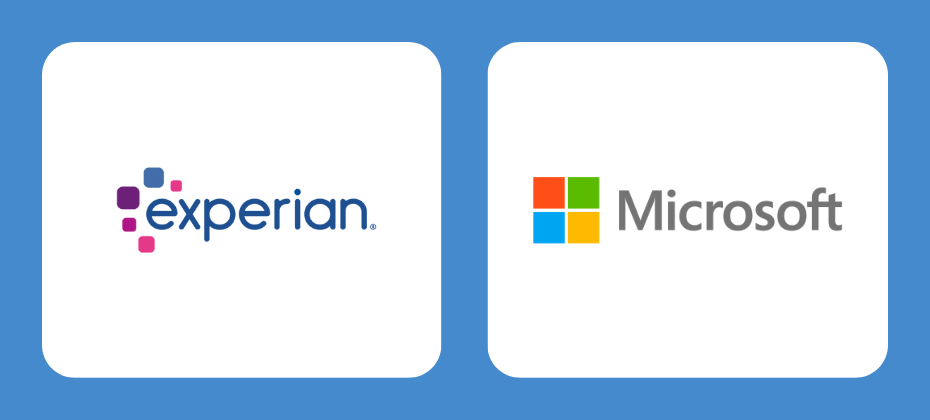
The digital advertising landscape has undergone a seismic shift in recent years. Privacy-conscious consumers, transformative regulations, and emerging technologies are converging to redefine how addressability — the ability to accurately reach a specific audience — functions in this new era. Addressability is a cornerstone of digital advertising, and its evolution presents both challenges and opportunities for publishers and advertisers alike. The need for enhancing addressability is driven by a complex set of factors. More consumers are opting out of data sharing or disabling cookie-tracking, leading to a drastic reduction in the reach of traditional programmatic advertising. Nearly 70 percent of consumers are now unreachable through these conventional methods, creating an 'addressability gap' that publishers and advertisers are eager to bridge. The landscape is further complicated by privacy regulations such as General Data Protection Regulation (GDPR) and California Consumer Privacy Act (CCPA), which mandate solutions that balance user privacy with advertisers' needs. Contributing to this intricate mix is the growing shift toward video and connected TV (CTV). These platforms have long operated in a cookie-less environment and are witnessing rising demand due to their engaging nature and broad reach. However, the attractiveness of these mediums to advertisers hinges on effective addressability, highlighting the urgent need for innovative audience identification and targeting methods. The emergence of data enablers and collaborative initiatives Data enablers like Experian are stepping up to meet this need. These companies are providing robust, privacy-compliant data resources to improve addressability. Experian's unique approach to identification, the Living Unit ID (LUID), is a key tool in bridging the current gap in reach. How Experian and Microsoft Advertising are redefining addressability We recently expanded our collaboration with Microsoft, to make our extensive data resources available through Microsoft Advertising’s data marketplace. This collaborative initiative represents a significant move, offering a compelling model of how data enablers and buy-side and sell-side platforms can work together to redefine addressability. The benefits of this arrangement extend to all stakeholders in the ecosystem. Advertisers using Microsoft Invest can now access Experian's audience data. This not only enhances the granularity of their audience targeting but also broadens the reach of their campaigns. Experian's identity spine also serves as a robust framework to extend the value and reach of advertisers' first-party data. For publishers, the accessibility of Experian data on Microsoft Advertising’s data marketplace opens the door to greater addressability in their inventory, enabling them to offer advertisers more addressable impressions. This then amplifies the value of their inventory, potentially increasing their overall yield. For advertisers, this integration facilitates access to highly relevant audiences while simplifying campaign setup and respecting user privacy. We can help you carve a new path toward addressability In the ever-evolving landscape of digital advertising, such collaborative efforts are becoming critical to ensure that advertising remains effective for brands, profitable for publishers, and respectful of consumer privacy. This model of cooperation and innovation is essential to navigate the challenges of a privacy-centric, cookie-less world and unlock the true potential of every media channel. With collaborative initiatives and innovative solutions, the industry is set to transform these challenges into opportunities, carving a new path toward addressability that respects privacy and delivers value for all stakeholders. Connect with us to learn more about how you can access our data in Microsoft Advertising’s data marketplace. To learn more about our partner Microsoft Advertising, visit their website. Contact us Latest posts
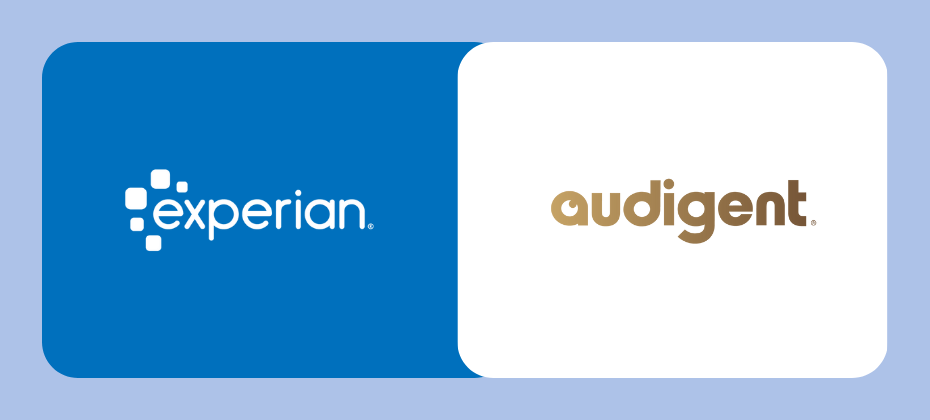
Advertisers are always looking for ways to improve the targeting and effectiveness of their campaigns. One strategy that's gaining popularity lately is using curated private marketplace (PMP) deals, allowing advertisers to buy premium ad inventory in a private auction environment. But how do data providers and PMPs work together to make PMP advertising more successful? What is a private marketplace (PMP)? Advertising PMPs, or private marketplace deals, are a type of programmatic advertising where advertisers and publishers negotiate and set up a direct deal between themselves to buy or sell advertising inventory in a private auction environment. In PMP deals, publishers can make their premium inventory available to a select group of advertisers, who can bid on it in a private auction using demand-side platforms (DSPs). These private auctions typically offer higher-quality inventory and a more targeted audience than open exchange auctions, which are accessible to all advertisers. However, traditional PMPs had their limitations, including often being limited to accessing inventory from a single publisher group. Audigent takes PMP advertising to the next level with SmartPMPs Audigent's key differentiator is that instead of activating audience data from the DSP, which is the industry standard, they integrate directly with supply-side platforms (SSPs). By taking this route, audience data and inventory from hundreds or even thousands of publishers can now be packaged together into a single deal ID / SmartPMP. SmartPMPs empower media buyers with the ability to access and buy against unique, customizable data segments on premium curated publisher inventory in combinations that otherwise would not have been available. Activating data via the supply-side also enables supply-side optimizations. This means that instead of simply being a data provider, Audigent plays an active role in the success of media buyers' programmatic campaigns by optimizing toward performance goals in coordination with demand-side buyers. The result is the full alignment of demand- and supply-side technologies for the first time in programmatic. SmartPMPs drive campaign performance Audigent performance data compared to the programmatic open exchange: How Experian and Audigent partner in PMP advertising Experian and Audigent collaborate using Consumer View audience data. By supplying valuable insights into users' interests, behaviors, and demographics, we help advertisers create more targeted and personalized ad campaigns with Audigent. This can lead to higher engagement rates, greater brand awareness, and increased conversions for Audigent and Experian clients. By activating Experian data via Audigent SmartPMPs, advertisers unlock the ability to reach highly engaged users across premium, curated inventory sources on key channels like connected TV (CTV), display, video, and more. Unlock the potential of programmatic advertising with us Our strategic collaboration with Audigent is transforming the programmatic advertising space. Our partnership enables our customers to tailor their ads directly to their desired audience. This elevated personalization results in higher conversion rates and optimized campaigns for superior ROI performance. Contact us for more information about our digital audience segments on the Audigent platform. To learn more about our partner Audigent, visit www.audigent.com. Contact us Get in touch Latest posts
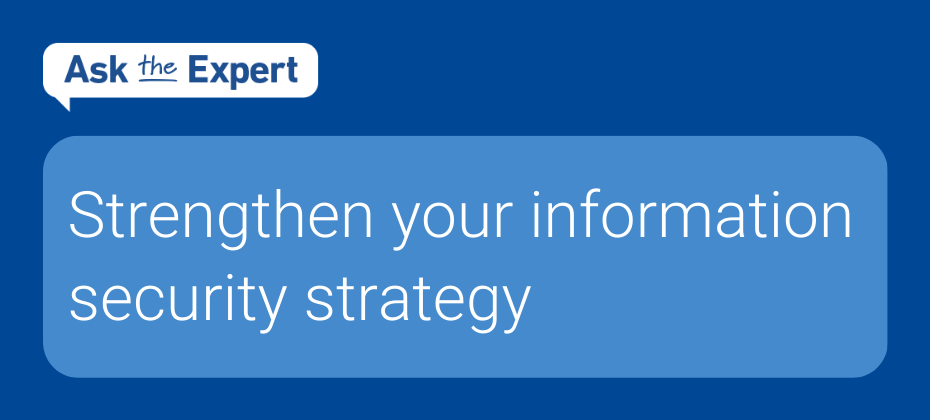
Up next in our Ask the Expert series, Ben Rothke, Senior Information Security Manager, reviews two certifications that should be part of your information security strategy: Service Organization Control (SOC) 2 Type 2 and International Organization for Standardization (ISO) 27001. Tapad, a part of Experian, is 27001 and SOC 2 Type 2 compliant. Two information security certifications you can trust Seals from Good Housekeeping and Underwriters Laboratories give consumers confidence that they can trust the product that they’re buying. For IT solutions or service providers, what, or who can you turn to for that seal of approval? There are many equivalent third-party attestations you can use. But which should you trust? The International Organization for Standardization (ISO) 27001 The American Institute of Certified Public Accountants (AICPA) System and Organization Controls (SOC) International Organization for Standardization (ISO) 27001 is an international standard for information security from the ISO. ISO 27001 is globally acknowledged and sets requirements for controls, maintenance, and certification of an information security management system (ISMS). This international standard provides organizations with a framework to identify, manage and reduce risks related to the security of information System and Organization Controls (SOC) The SOC, as defined by the AICPA, is a set of audit reports. SOC reports, like 27001 certificates, are used by service organizations to give their customers the confidence they have adequate information security controls in place to protect the data that they handle. SOC 2 is an assessment of controls at a service organization regarding security, availability, processing integrity, confidentiality, and privacy. The purpose of the report is to provide extensive information and assurance to a broad range of users about the controls at a service organization that are relevant to the security, availability, and processing integrity of the systems that process user data, as well as the confidentiality and privacy of the information processed by these systems. Why ISO 27001 and SOC 2 are important The value of these third-party attestations is two-fold: Organizations can show they have passed an independent external audit Third-party attestations save organizations the time of having to do their own audits In addition to 27001 and SOC 2 Type 2 compliance, we are also certified with ISO 27017 and 27018, which are add-ons to 27001 that are specific to cloud computing. We take the security and privacy of our customers’ data as seriously as they do. Every cloud service provider (CSP) has a responsibility matrix that details what security and privacy tasks they are responsible for and which ones the customer is responsible for. Any cloud customer that needs to be made aware of what their security tasks are is putting themselves at risk. So, when you want to engage a CSP, ask them for their attestations. They worked hard for them and will be proud to share their compliance. We’re powered by decades of setting standards in marketing services At Experian, we’re a privacy-first business. We’re highly focused on respecting people, their data, and their privacy. We continue to show our dedication to information security by completing these security audits every year. The constant changes to data compliance regulations can be challenging to navigate, but you don’t have to do it alone. Contact us today. We will be your guide so you can ethically and confidently reach your customers. Contact us today Contact us today About our expert Ben Rothke, Senior Information Security Manager Ben Rothke, CISSP, CISA, is a Senior Information Security Manager at Tapad, a part of Experian. He has over 25 years of industry experience in information systems security and privacy. His areas of expertise are in risk management and mitigation, security and privacy regulatory issues, cryptography, and security policy development. Ben is the author of Computer Security - 20 Things Every Employee Should Know (McGraw-Hill), and writes security and privacy book reviews for the RSA Conference Blog and Security Management magazine. Latest posts

Experian Marketing Services and Data Quality President Genevieve Juillard recently sat down with Zach Rodgers, host of the AdExchanger Talks podcast to discuss the future of identity, the importance of data transparency and privacy, and our recent acquisition of Tapad. Genevieve focused on the opportunity for our industry to reimagine an advertising ecosystem that is resilient and adaptable; one that takes advantage of emerging data and prioritizes data transparency and consumer privacy. She also discussed the importance of advertising strategies that put consumers at the heart of every decision and give them more control over their data. Genevieve shared with AdExchanger that Experian’s acquisition of Tapad, a global leader in digital identity resolution, was a natural fit for our company. Tapad’s approach and role in the ecosystem is very much aligned with Experian’s, which is to develop solutions that are resilient to industry and consumer changes. The combination of our capabilities supports interoperability across all types of identifiers, both online and offline, and will position us to help our clients navigate the post-third-party cookie world. To learn more about Experian’s plans to support an effective advertising ecosystem that will evolve with our dynamic industry, listen to the full podcast Embracing ‘Healthy Fragmentation’ In Ad Tech, With Genevieve Juillard. Get in touch

To our valued customers and partners, it’s been an exciting week here at Tapad! As announced in a press release this morning, Tapad is now a member of the Experian family. We’re thrilled to continue to grow as a leader in identity resolution under the umbrella of a global expert in data, analytics and technology. Tapad and Experian are deeply connected by our commitment to serving the needs of our customers; and with a focus on quality of the data we provide, we have a common goal for the future of identity in the advertising ecosystem. As part of this announcement, we wanted to assure you, our valued customer, that we remain deeply committed to serving you today just as we always have. Nothing will change in your daily operations with Tapad. Experian immediately recognized that the success and growth of Tapad was directly tied to the strength and depth of its team members. As such, the acquisition will not result in any changes to day-to-day contacts at Tapad, or processes with weekly graph deliveries and other product support. Experian’s faith and investment in Tapad’s future and the future of identity resolution underscores what we’ve always believed our products could achieve and that we will be able to continue serving brands, advertisers, publishers, and the advertising and marketing ecosystem for years to come. On a personal note, I am excited to be transitioning my role as Chief Operating Officer of Tapad to the General Manager position of a global business that’s achieved exponential growth over the past several years; culminating in this strategic acquisition that will no doubt bring even more value to our customers in the future. We remain committed to open communication and welcome any questions you may have. Thank you,Mark Connon | General Manager, Tapad Contact us today